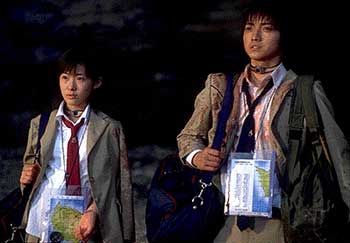by Sara Ellis
|
"The young people who killed or were killed in 'Battle Royale' were third year junior high school students; that idea generates extremely intense feelings for me," states Fukasaku in a pamphlet about the film that he distributed. "I was that exact age at the end of World War II. I experienced air raids a number of times ... Suddenly there would be bullets falling out of the sky, there was nowhere to run or hide. My friends and I survived by huddling together. In the aftermath, we had to sort through the bodies, that was the job for us third year junior high school students. It was the first time I'd seen so much death, picking up the arms and legs that were scattered here and there was something I was determined to do." Fukusaku's wartime experience can probably explain his impatience working with a cast that has had a far easier childhood. Renowned for his on-set tantrums, Fukasaku was far from willing to spare the rod when one of the film's youthful cast members messed up. "Movie is the Battlefield," a documentary on the making of "Battle Royale," features scenes of the septuagenarian director flying off the handle, at one point making a point by hurling a can of coffee into a table Ironically, the Ministry's vehement denouncement of the film did not precede itself with a censure of the best-selling novel, or a later comic book adaptation that has some fans disappointed with the comparatively low-level of violence in the film. If violence in film truly disturbs the Minstry, then they have remained conspicuously silent about the stacks of violently pornographic manga openly sold in convenience stores and at kiosks. Women being raped by robots is fine, kids fighting back against an oppressive system, is not. A closer look into teen violence and crime in Japan reveals that, if anything, "Battle Royale" is a glossily overwrought product of the real problems that exist within the Japanese education system and its methods for reforming juvenile offenders. An inordinate amount of pressure placed upon students to pass entrance examinations begins in elementary school and continues until kids enter university. Classes are taught with a unilateral methodology that suppresses creativity, and is a major source of psychological stress. According to journalist Karel Von Wolferen, author of "Enigma of Japanese Power," the education system is one in which "thirty percent of elementary school children, fifty percent of middle school pupils, and seventy percent of high school students cannot keep up." And these days, that system which forces students into a state of perpetual, exhausting competition, comes bereft of the rewards that such hard work brought to previous generations. A rising unemployment rate and the demise of the life time employment system has taken the significance out of what was already meaningless toil for many of the nation's young people. Although, the Ministry has decided to cut the curriculum by one third, Japan's waning population has created greater competition among the country's private schools who woo the parents of prospective students with the promise that their son or daughter can enter a good university. In order to do this, they must raise their academic rating, which is measured mainly through excessive examinations given to students on a regular basis. This added pressure on many of the nation's adolescents has done more than make up for any pressure relief from an abbreviated curriculum.
The very curriculum taught at the nation's schools also weathers blame for a growing apathy amongst its youth. Monbusho simply adores censorship, relishing an intellectual rein over the content of the nation's text books that makes the Scopes trial look like an insignificant legal spat. Their most controversial cuts to date have been to history texts, which up until very recently vigorously denied the atrocities committed by the Japanese military in Korea and China during World War II. Thanks to a lawsuit carried on for over thirty years by historian Saburo Ienaga Japanese texts have begun, however lightly, to touch upon the brutality of Japan's bellicose past. However, the fight against Monbusho censorship has merely gone from a Sisyphean task to a steep uphill struggle. Monbusho has vigorously curtailed the opportunity for Japanese students to reflect on their nation's violent past and, in effect block a mean to understanding the value of remorse. One Ministry solution is to add ethics courses to the students' already onerous curriculum. Unfortunately, rather than encouraging students to think about the problems facing their society, rinri (ethics) is simply another example of the ineffective lecture model, turning the subject into one many Japanese students place above math as their most boring subject. |

